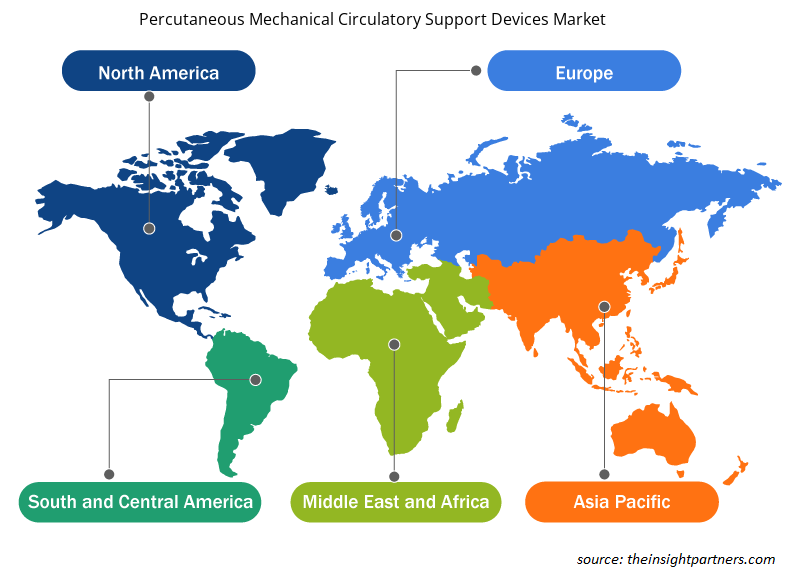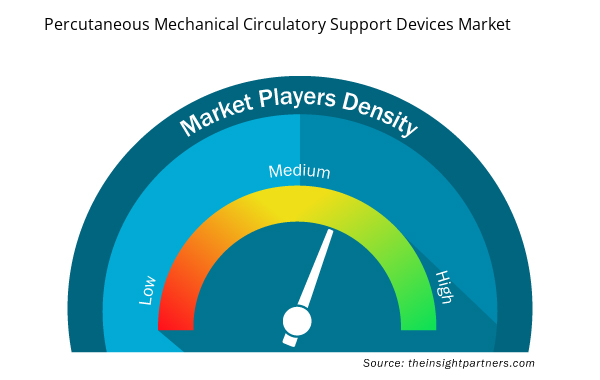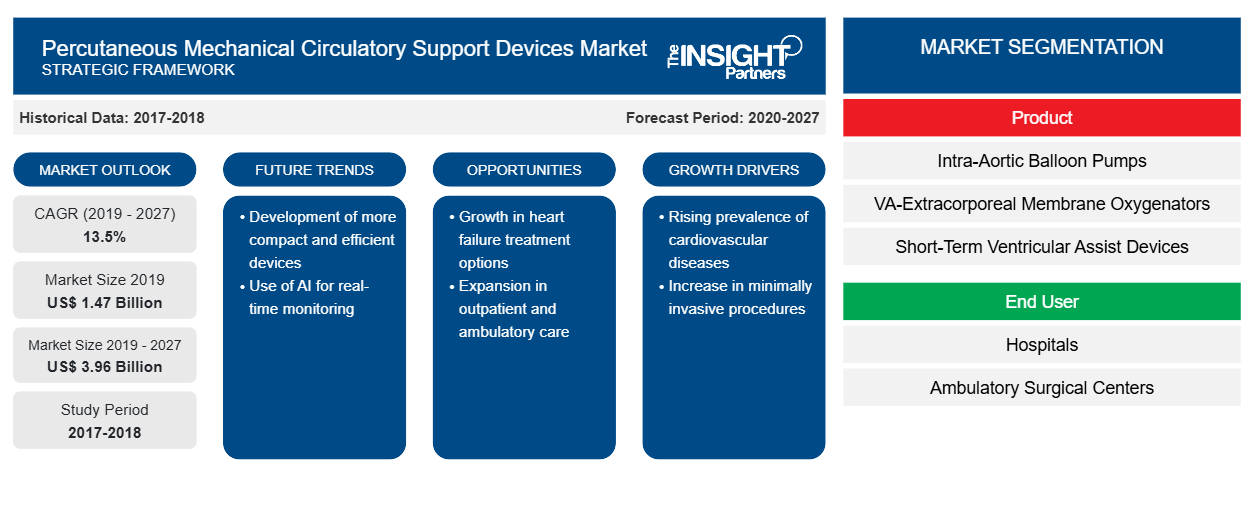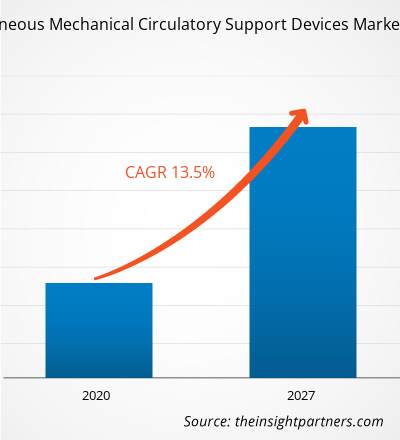Der Markt für perkutane mechanische Kreislaufunterstützungsgeräte wurde im Jahr 2019 auf 1.474,28 Millionen US-Dollar geschätzt und soll bis 2027 3.964,75 Millionen US-Dollar erreichen; für den Zeitraum 2020–2027 wird mit einer durchschnittlichen jährlichen Wachstumsrate von 13,5 % gerechnet.
Perkutane mechanische Kreislaufunterstützungsgeräte bieten eine effektive und schnelle Methode, um die Abwärtsspirale der hämodynamischen Instabilität bei Patienten mit dekompensierter Herzinsuffizienz und kardiogenem Schock zu verlangsamen, bis eine definitivere Strategie zur Genesung der Patienten von diesen Herzerkrankungen gefunden ist. Zu den Hauptfunktionen der perkutanen mechanischen Kreislaufunterstützungsgeräte gehören die Verbesserung des nativen Herzzeitvolumens, die Reduzierung des Ventrikelvolumens und des Füllungsdrucks, die Steigerung der Koronardurchblutung und die Aufrechterhaltung der Durchblutung lebenswichtiger Organe.
Markteinblicke:
Steigende geriatrische Bevölkerung
Das hohe Marktwachstum wird aufgrund der steigenden globalen geriatrischen Bevölkerung erwartet. Sowohl bei Männern als auch bei Frauen steigt das Risiko von Herz-Kreislauf-Erkrankungen mit zunehmendem Alter. Alternde Blutgefäße sind weniger flexibel, was zu einer verringerten Durchblutung führt. Daher ist das Risiko einer Herzerkrankung bei älteren Menschen hoch. Laut der Statistik für Herzkrankheiten und Schlaganfälle 2018 liegt das Durchschnittsalter beim ersten Herzinfarkt bei 65,6 Jahren für Männer und 72,0 Jahren für Frauen. Außerdem wird erwähnt, dass die jährliche Inzidenz eines Herzinfarkts in den USA 720.000 neue Anfälle und 335.000 wiederkehrende Anfälle beträgt. Darüber hinaus wird laut den National Institutes of Health (NIH) erwartet, dass sich die Bevölkerung der über 65-Jährigen in Amerika in den nächsten drei Jahrzehnten fast verdoppeln wird, von 48 Millionen auf 88 Millionen im Jahr 2050. Herz-Kreislauf-Erkrankungen (CVD) bei älteren Amerikanern stellen eine enorme Belastung in Bezug auf Mortalität, Morbidität, Behinderung, Funktionsverlust und Gesundheitskosten dar. Eine retrospektive Studie der University of Pittsburgh aus dem Jahr 2015 besagt, dass die Prävalenz von CVD, einschließlich Bluthochdruck, angeborener Herzkrankheit, Herzinsuffizienz und Schlaganfall, bei Männern und Frauen im Alter von 40–59 Jahren um etwa 40 % und bei Personen im Alter von 60–79 Jahren um 70–75 % und bei Personen ab 80 Jahren um 79–86 % zunimmt. Die wachsende geriatrische Bevölkerung, die zu einem höheren Risiko von Herzinsuffizienzen und kardiogenen Schocks führt, führt also zu einem vermehrten Einsatz von perkutanen mechanischen Kreislaufunterstützungsgeräten und fördert letztendlich das Marktwachstum.
Passen Sie diesen Bericht Ihren Anforderungen an
Sie erhalten kostenlos individuelle Anpassungen an jedem Bericht, einschließlich Teilen dieses Berichts oder einer Analyse auf Länderebene, eines Excel-Datenpakets sowie tolle Angebote und Rabatte für Start-ups und Universitäten.
- Holen Sie sich die wichtigsten Markttrends aus diesem Bericht.Dieses KOSTENLOSE Beispiel umfasst eine Datenanalyse von Markttrends bis hin zu Schätzungen und Prognosen.
Produktbasierte Markteinblicke
Das Produktsegment des Marktes für perkutane mechanische Kreislaufunterstützungsgeräte ist in intraaortische Ballonpumpen, VA-extrakorporale Membranoxygenierung und kurzfristige ventrikuläre Unterstützungssysteme unterteilt. Das Segment der intraaortischen Ballonpumpen hatte 2019 den größten Anteil am Markt für perkutane mechanische Kreislaufunterstützungsgeräte. Das Segment der kurzfristigen ventrikulären Unterstützungssysteme wird im Prognosezeitraum voraussichtlich mit einer durchschnittlichen jährlichen Wachstumsrate von 14,0 % wachsen.
Endbenutzerbasierte Markteinblicke
Das Endverbrauchersegment des Marktes für perkutane mechanische Kreislaufunterstützungsgeräte ist in Krankenhäuser, ambulante chirurgische Zentren und andere unterteilt. Das Krankenhaussegment hielt 2019 den größten Anteil am Markt für perkutane mechanische Kreislaufunterstützungsgeräte. Es wird außerdem erwartet, dass das Segment im Prognosezeitraum mit einer durchschnittlichen jährlichen Wachstumsrate von 14,2 % wächst.
Strategien zur Produkteinführung und Produktzulassung werden von Unternehmen häufig eingesetzt, um ihre Präsenz und ihr Produktportfolio weltweit zu erweitern und der steigenden Nachfrage gerecht zu werden.
Darüber hinaus verfolgen die Marktteilnehmer auf dem Markt für perkutane mechanische Kreislaufunterstützungssysteme eine Expansionsstrategie, um ihre Kundenbasis weltweit zu vergrößern und so ihren Markennamen weltweit zu behaupten. So brachte Medetronic im Juni 2016 ein Produkt auf den Markt – Beacon, einen Pflegemanagementdienst für Hochrisikopatienten mit Herzinsuffizienz. Dieser Dienst kombiniert Daten von implantierbaren Kardioverter-Defibrillatoren (ICD) oder Geräten zur kardialen Resynchronisationstherapie (CRT) von Medtronic mit der postakuten Überwachung durch MCMS.
Regionale Einblicke in den Markt für perkutane mechanische Kreislaufunterstützungsgeräte
Die regionalen Trends und Faktoren, die den Markt für perkutane mechanische Kreislaufunterstützungsgeräte während des gesamten Prognosezeitraums beeinflussen, wurden von den Analysten von Insight Partners ausführlich erläutert. In diesem Abschnitt werden auch die Marktsegmente und die Geografie für perkutane mechanische Kreislaufunterstützungsgeräte in Nordamerika, Europa, im asiatisch-pazifischen Raum, im Nahen Osten und Afrika sowie in Süd- und Mittelamerika erörtert.

- Erhalten Sie regionale Daten zum Markt für perkutane mechanische Kreislaufunterstützungsgeräte
Umfang des Marktberichts zu perkutanen mechanischen Kreislaufunterstützungsgeräten
| Berichtsattribut | Details |
|---|---|
| Marktgröße im Jahr 2019 | 1,47 Milliarden US-Dollar |
| Marktgröße bis 2027 | 3,96 Milliarden US-Dollar |
| Globale CAGR (2019 - 2027) | 13,5 % |
| Historische Daten | 2017-2018 |
| Prognosezeitraum | 2020–2027 |
| Abgedeckte Segmente | Nach Produkt
|
| Abgedeckte Regionen und Länder | Nordamerika
|
| Marktführer und wichtige Unternehmensprofile |
|
Marktteilnehmerdichte: Der Einfluss auf die Geschäftsdynamik
Der Markt für perkutane mechanische Kreislaufunterstützungsgeräte wächst rasant, angetrieben von der steigenden Nachfrage der Endnutzer aufgrund von Faktoren wie sich entwickelnden Verbraucherpräferenzen, technologischen Fortschritten und einem größeren Bewusstsein für die Vorteile des Produkts. Mit steigender Nachfrage erweitern Unternehmen ihr Angebot, entwickeln Innovationen, um die Bedürfnisse der Verbraucher zu erfüllen, und nutzen neue Trends, was das Marktwachstum weiter ankurbelt.
Die Marktteilnehmerdichte bezieht sich auf die Verteilung von Firmen oder Unternehmen, die in einem bestimmten Markt oder einer bestimmten Branche tätig sind. Sie gibt an, wie viele Wettbewerber (Marktteilnehmer) in einem bestimmten Marktraum im Verhältnis zu seiner Größe oder seinem gesamten Marktwert präsent sind.
Die wichtigsten Unternehmen auf dem Markt für perkutane mechanische Kreislaufunterstützungsgeräte sind:
- Abbott.
- Medtronic
- Getinge AB
- Teleflex Incorporated
- Livanova Plc (Cardiacassist, Inc.).
Haftungsausschluss : Die oben aufgeführten Unternehmen sind nicht in einer bestimmten Reihenfolge aufgeführt.

- Erhalten Sie einen Überblick über die wichtigsten Akteure auf dem Markt für perkutane mechanische Kreislaufunterstützungsgeräte
Globaler Markt für perkutane mechanische Kreislaufunterstützungsgeräte – ByProduct
- Intraaortische Ballonpumpen
- VA-Extrakorporale Membranoxygenierung (ECMO)
- Oxygenatoren
- Kurzzeit-Ventrikelunterstützungssysteme (VADs)
- Impella
- Tandemherz
Globaler Markt für perkutane mechanische Kreislaufunterstützungsgeräte – nach Endbenutzer
- Krankenhäuser
- Ambulante Chirurgische Zentren
- Sonstiges
Globale perkutane mechanische Kreislaufunterstützungsgeräte – nach Geografie
Nordamerika
- UNS
- Kanada
- Mexiko
Europa
- Frankreich
- Deutschland
- Italien
- Vereinigtes Königreich
- Spanien
- Restliches Europa
Asien-Pazifik (APAC)
- China
- Indien
- Südkorea
- Japan
- Australien
- Restlicher Asien-Pazifik-Raum
Naher Osten und Afrika (MEA)
- Südafrika
- Saudi-Arabien
- Vereinigte Arabische Emirate
- Rest von MEA
Südamerika (SAM)
- Brasilien
- Argentinien
- Rest von SAM
Firmenprofile
- Abbott.
- Medtronic
- Getinge AB
- Teleflex Incorporated
- Livanova Plc (Cardiacassist, Inc.).
- Abiomed
- Eurosätze
- Berlin Heart
- Jarvik Heart, Inc.
- CardioBridge GmbH
- Historische Analyse (2 Jahre), Basisjahr, Prognose (7 Jahre) mit CAGR
- PEST- und SWOT-Analyse
- Marktgröße Wert/Volumen – Global, Regional, Land
- Branche und Wettbewerbsumfeld
- Excel-Datensatz



Report Coverage
Revenue forecast, Company Analysis, Industry landscape, Growth factors, and Trends

Segment Covered
This text is related
to segments covered.

Regional Scope
North America, Europe, Asia Pacific, Middle East & Africa, South & Central America

Country Scope
This text is related
to country scope.
Häufig gestellte Fragen
The North American region holds the largest market for the breast cancer screening. The United States held the largest market for percutaneous mechanical circulatory support devices market and is expected to grow due to factors such as increasing number ofincreasing prevalence of cardiovascular diseases & heart failures, growing developments for screening and imaging process by the companies and others.
The growth of the market is attributed to some key driving factors such as rising geriatric population, increasing prevalence of cardiovascular diseases & heart failures however, impact of COVID-19 pandemic on medical device industry and high cost of products and procedures is expected to restraint the growth of the market during the forecast years.
The percutaneous mechanical circulatory support devices market is highly competitive in nature with considerable number of players, having a high level of consolidation overall revenue share. Most of the companies operating in the percutaneous mechanical circulatory support devices market are present globally and have wide distribution and sales network through partnerships or authorized dealers.
Trends and growth analysis reports related to Life Sciences : READ MORE..
The List of Companies - Percutaneous Mechanical Circulatory Support Devices Market
- Abbott.
- Medtronic
- Getinge AB
- Teleflex Incorporated
- Livanova Plc (Cardiacassist, Inc.).
- Abiomed
- Eurosets
- Berlin Heart
- Jarvik Heart, Inc.
- CardioBridge GmbH
The Insight Partners performs research in 4 major stages: Data Collection & Secondary Research, Primary Research, Data Analysis and Data Triangulation & Final Review.
- Data Collection and Secondary Research:
As a market research and consulting firm operating from a decade, we have published and advised several client across the globe. First step for any study will start with an assessment of currently available data and insights from existing reports. Further, historical and current market information is collected from Investor Presentations, Annual Reports, SEC Filings, etc., and other information related to company’s performance and market positioning are gathered from Paid Databases (Factiva, Hoovers, and Reuters) and various other publications available in public domain.
Several associations trade associates, technical forums, institutes, societies and organization are accessed to gain technical as well as market related insights through their publications such as research papers, blogs and press releases related to the studies are referred to get cues about the market. Further, white papers, journals, magazines, and other news articles published in last 3 years are scrutinized and analyzed to understand the current market trends.
- Primary Research:
The primarily interview analysis comprise of data obtained from industry participants interview and answers to survey questions gathered by in-house primary team.
For primary research, interviews are conducted with industry experts/CEOs/Marketing Managers/VPs/Subject Matter Experts from both demand and supply side to get a 360-degree view of the market. The primary team conducts several interviews based on the complexity of the markets to understand the various market trends and dynamics which makes research more credible and precise.
A typical research interview fulfils the following functions:
- Provides first-hand information on the market size, market trends, growth trends, competitive landscape, and outlook
- Validates and strengthens in-house secondary research findings
- Develops the analysis team’s expertise and market understanding
Primary research involves email interactions and telephone interviews for each market, category, segment, and sub-segment across geographies. The participants who typically take part in such a process include, but are not limited to:
- Industry participants: VPs, business development managers, market intelligence managers and national sales managers
- Outside experts: Valuation experts, research analysts and key opinion leaders specializing in the electronics and semiconductor industry.
Below is the breakup of our primary respondents by company, designation, and region:

Once we receive the confirmation from primary research sources or primary respondents, we finalize the base year market estimation and forecast the data as per the macroeconomic and microeconomic factors assessed during data collection.
- Data Analysis:
Once data is validated through both secondary as well as primary respondents, we finalize the market estimations by hypothesis formulation and factor analysis at regional and country level.
- Macro-Economic Factor Analysis:
We analyse macroeconomic indicators such the gross domestic product (GDP), increase in the demand for goods and services across industries, technological advancement, regional economic growth, governmental policies, the influence of COVID-19, PEST analysis, and other aspects. This analysis aids in setting benchmarks for various nations/regions and approximating market splits. Additionally, the general trend of the aforementioned components aid in determining the market's development possibilities.
- Country Level Data:
Various factors that are especially aligned to the country are taken into account to determine the market size for a certain area and country, including the presence of vendors, such as headquarters and offices, the country's GDP, demand patterns, and industry growth. To comprehend the market dynamics for the nation, a number of growth variables, inhibitors, application areas, and current market trends are researched. The aforementioned elements aid in determining the country's overall market's growth potential.
- Company Profile:
The “Table of Contents” is formulated by listing and analyzing more than 25 - 30 companies operating in the market ecosystem across geographies. However, we profile only 10 companies as a standard practice in our syndicate reports. These 10 companies comprise leading, emerging, and regional players. Nonetheless, our analysis is not restricted to the 10 listed companies, we also analyze other companies present in the market to develop a holistic view and understand the prevailing trends. The “Company Profiles” section in the report covers key facts, business description, products & services, financial information, SWOT analysis, and key developments. The financial information presented is extracted from the annual reports and official documents of the publicly listed companies. Upon collecting the information for the sections of respective companies, we verify them via various primary sources and then compile the data in respective company profiles. The company level information helps us in deriving the base number as well as in forecasting the market size.
- Developing Base Number:
Aggregation of sales statistics (2020-2022) and macro-economic factor, and other secondary and primary research insights are utilized to arrive at base number and related market shares for 2022. The data gaps are identified in this step and relevant market data is analyzed, collected from paid primary interviews or databases. On finalizing the base year market size, forecasts are developed on the basis of macro-economic, industry and market growth factors and company level analysis.
- Data Triangulation and Final Review:
The market findings and base year market size calculations are validated from supply as well as demand side. Demand side validations are based on macro-economic factor analysis and benchmarks for respective regions and countries. In case of supply side validations, revenues of major companies are estimated (in case not available) based on industry benchmark, approximate number of employees, product portfolio, and primary interviews revenues are gathered. Further revenue from target product/service segment is assessed to avoid overshooting of market statistics. In case of heavy deviations between supply and demand side values, all thes steps are repeated to achieve synchronization.
We follow an iterative model, wherein we share our research findings with Subject Matter Experts (SME’s) and Key Opinion Leaders (KOLs) until consensus view of the market is not formulated – this model negates any drastic deviation in the opinions of experts. Only validated and universally acceptable research findings are quoted in our reports.
We have important check points that we use to validate our research findings – which we call – data triangulation, where we validate the information, we generate from secondary sources with primary interviews and then we re-validate with our internal data bases and Subject matter experts. This comprehensive model enables us to deliver high quality, reliable data in shortest possible time.


 Holen Sie sich ein kostenloses Muster für diesen Bericht
Holen Sie sich ein kostenloses Muster für diesen Bericht